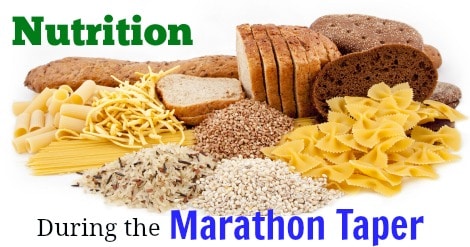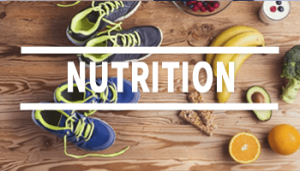During extensive marathon training you will build strength, endurance, and confidence in your ability to take on the marathon. At the same time, marathon training can break you down. It will break down your muscle fibers, deplete you glycogen stores, and leave you feeling tired and fatigued.
That is why the marathon taper is such an important component of training. You need time to heal any damage that has happened from training and also to fill up your muscles’ glycogen stores.
From a training perspective, here is a great guide on how to taper for a marathon while preserving your fitness leading up to the big day. We also have a sample taper schedule from elite runner Nate Jenkins for you to peruse.
In this article, we will provide you with a nutrition guide on how to eat during the taper to ensure optimal energy stores and avoid unwanted weight gain.

Decrease Calories, Keep Up Carbs
The biggest mistake most marathoners make is not cutting down on food intake even though they are burning significantly fewer calories through exercise.
Most marathon taper plans start with the last long run 3 weeks out from race day, with running volume significantly decreasing each week. Since you will be exercising less, you don’t need as many calories as you did when you were burning them for training.
If you normally ran 10 miles in a day while training, and during the taper you only ran 6, you would burn approximately 400 calories less.
The excess calories not being used for exercise can be used to load up your muscle glycogen stores, but they could also accumulate into unwanted weight gain.
To be sure that you are adding to your glycogen stores and not just promoting weight gain, you must pay special attention to slowly decreasing your overall caloric intake while maintaining adequate carbohydrate intake.
In order to decrease calories but keep up carbohydrate intake you will have to trade some of the calories coming from fat for more carbohydrates. Fat should still contribute 20-25% of your total daily calories, but since you will be eating fewer calories this will mean less total grams from fat.
The following are some swaps you can make to cut down on fat and increase carbohydrate:
- Pancakes with maple syrup instead of butter
- Pasta with tomato sauce instead of cheese or a cream-based sauce
- Salad with an extra dinner roll instead of full-fat dressing
- Extra plain baked potato instead of “fully loaded” (butter, sour cream, cheese)
The goal for carbohydrates should be to maintain a daily intake of 3-5 grams per pound of body weight (6-10 g/kg). For a 150-lb athlete this will be approximately 450-750 grams (1800-3000 calories).
That is a lot of calories, so you have to be smart about keeping to a number within that range that is relative to your overall caloric needs. If you only need 3000 calories per day, then 450-500 grams would be adequate.
Your body size plays a role as well. Smaller athletes should aim for the higher end of their range while larger athletes should stick towards the lower end.
If you read my previous article Carbohydrate Loading: 3 Effective Methods to Increase Your Chances of Marathon Success, you learned that you can double your muscle glycogen stores with adequate carbohydrate intake. You also learned that extra glycogen stores extra water, which shows up as extra weight.
This is nothing to be concerned about.
If you are properly carbohydrate loaded, you should expect to be 2-4 pounds heavier due to the extra water stored in your body.
Protein For Maintenance and Repair
Protein is needed to repair and reverse muscle damage and fatigue resulting from prolonged distance training.
The goal for protein should be approximately 0.6-0.7 gram per pound (1.3-1.6 g/kg). Going back to our example of the 150-lb athlete, this would be 90-105 grams of protein per day.
This can easily be achieved by having a couple of servings of lean protein (chicken, turkey, roast beef, fish) or protein-rich foods (eggs, beans, tofu, lentils) each day as well as dairy products, which are good sources of protein and carbohydrate.
Keep in mind that many grains can contribute protein, as well. One serving of pasta (2 dry ounces) has about 42 grams of carbohydrate and 7 grams of protein. One slice of whole-grain bread has about 20 grams of carbohydrate and 4 grams of protein.
Choose More Fiber, Less Junk
Eating foods rich in fiber promotes regular bowel movements while eating too many refined products (white bread, pasta, rice) can lead to constipation, especially when training has been decreased.
Good sources of fiber include fruits, vegetables, and whole-grain breads, pastas, and cereals. Fruits and vegetables are also a good source of antioxidants, which can boost the immune system and ward off illness.
Be careful not to overdo it on fiber as it could unwittingly cause runner’s diarrhea and subsequently bring about dehydration and electrolyte imbalances. Popular fiber bars or other fiber-enriched foods are not necessary. Stick with the foods you normally eat and are comfortable with.
Remember that you are exercising less, so you need to make each calorie count. Don’t waste it on “empty calories” like cookies, candy and ice cream that may have fit in while you were training hard. Save those treats for after the race and use the last few weeks to hone in on good nutrition practices to optimize your performance.
Fruits and Veggies
Similar to above, make sure you keep a healthy variety of fruits and vegetables in your diet to ensure you get all of your essential vitamins and minerals so you don’t get sick in the final weeks of your training.
If you’re like me and you struggle to eat your fruits and veggies (or eat the same type all the time), consider a greens supplement like athletic greens.
A greens supplement is especially helpful if you’re someone who doesn’t eat fruits and veggies regularly. You may not have them easily available, are not used to eating them so will forget about them, or aren’t used to cooking with them.
Because it’s as simple as adding a scoop to your morning glass of water, you easily get in your daily recommended fruit and veggie servings (plus more) and you have the added bonus of staying hydrated (next point below).
If you want to try them out and get set before your taper, they have are currently running a special bonus of 5 travel packs and a year’s supply of vitamin D. Check it out here.
Hydrate
Dehydration can significantly impair performance, but it is preventable with adequate hydration in the weeks, days, and hours leading up to the race.
To ensure you are properly hydrate, sip on fluids throughout the day. Water is sufficient, but juices and sports drinks can help meet your carbohydrate needs if you find that the food volume is too much. However, don’t rely solely on these beverages since they contain a lot of sugar.
Instead of looking for a specific number of ounces to drink, I implore you to use your body’s own measures of hydration. You should have to urinate every 2-4 hours and your urine should be pale yellow. If it is darker, then hydrate more. If it is clear, you may be hydrating too much.
Race Day Nutrition
After months of training you can rest assured that you are ready for the big race. There is no further training you can do to make yourself anymore ready. As they say, the hay is in the barn. The same is true for nutrition.
Hopefully you have been as diligent with you nutrition as you have been with your training, especially during the taper period. There is nothing you can do the day before the race to make up for poor nutrition in the months and weeks leading up to it. However, here are a few tips for race day nutrition that can help you optimize the hard work you have done.
- Reduce fiber intake. Although you want to have enough fiber to promote normal bowel function, too much fiber can cause diarrhea, especially when combined with race day nerves.
- Stay away from alcohol. Alcohol is empty calories and can lead to dehydration. You can wait for the post race celebration to indulge in some adult beverages.
- Eat your biggest meal at lunch. It is a common tradition to have a carbo-load meal the night before the race, but eating this meal earlier in the day will ensure adequate time for digestion. You don’t want to be uncomfortably full on race morning so try eating a big meal earlier and a normal size meal the night before.
- Eat breakfast. Eating breakfast is important because a small meal rich in carbohydrates will help prevent hunger and maintain a normal blood sugar level. Stick with foods that are familiar and those you have been eating throughout your training.
- Have a fueling plan for your race. Each individual is different with how they fuel and what they use during the race. You should have practiced your race day fueling while in training so don’t change that up last minute. Figure out what works for you and stick with it.
- If you’re still looking for more, here are 6 more nutrition tips for the perfect marathon taper.
Feel free to ask any questions you have in the comments section. I am sure many runners have the same fears and questions, and I would love to help!





7 Responses
This is disappointing – it’s the same tried & true information that’s been out there for years. It’s why I never have any faith in sports nutrition coming from these sites and standard dieticians. Have you done new research? Sports nutrition is changing big-time. Look up Tim Noakes new stuff on LCHF (and actually read the scientific reasoning behind it instead of simply blowing it off). The marathoner changed his diet to high-fat, lower-carb when he found out he was pre-diabetic in We cannot learn new things if we don’t educate ourselves on it and research. Also the Natural Nutritionist (.com.au) has great resources and scientific/practical reasoning behind it.
Hi Jenni, we do have some posts on this also, but at this point, it is too late for runners to change their nutritional intake, as you must be very careful this close to the race. We did interview Tim Noakes and Phil Maffetone on our podcast, which you can check out here; https://runnersconnect.net/running-interviews/interview-with-dr-tim-noakes-hydration-the-role-of-the-brain-in-racing-and-his-latest-findings-on-carbohydrates-for-runners/ https://runnersconnect.net/running-interviews/why-being-fit-doesnt-necessarily-mean-youre-healthy-how-running-below-your-aerobic-threshold-can-help-you-burn-more-fat-stay-healthy-and-run-faster/
Hopefully you enjoy these ones also. We are continuously researching new topics, check out our blog page for our latest research. This post is older, and we are only sharing it for people who have not seen it in the past. Hope you enjoy the newer research, which is based off studies that have come through in the past few years; https://runnersconnect.net/blog/
Hope this helps!
I tried the high fat, low carb diet. It didnt do anything for me but leave me feeling sluggish and weighed down. I much more prefer high carb diets. On carbs i run faster and run faster.
Hi Blaine, that is your personal choice, and as long as you have found what works for you, keep it up! Thanks for sharing!
I had spaggetti with meat sauce night b4 half marathon….wrong choice…donut with a sbucks frap drink in bottle morning of race…boy did i pay…lol..i will never do that again….sometimes you have to learn the hard way… i learned.loll
Ouch! Yes, bet that was uncomfortable. Just means you will feel so much better when you do it right the next time 🙂
Hi – I’m trying to optimize my nutrition through the taper period and have a question. I am generally keeping my calorie intake equal to my daily calorie burn, which I’ve estimated at 1800-3500 calories depending on the intensity of the day’s workout. I think my estimates have been generally accurate as I’ve maintained pretty consistent weight. But the issue is under that framework it becomes very difficult to eat 3-5 grams of carbs per pound daily through the taper, because at my weight (about 143lbs) would imply about 1,700 calories from carbs at the low end and 2,900 at the high end, which just seems too high — put differently it’s suggesting that ~95% of my calories should come from carbs on certain days, which is obviously unrealistic / unhealthy. So I guess I’m just trying to reconcile the absolute amount of calories I’m eating (equal to amount burned) with that benchmark for carb intake — I should either be eating more absolute calories or focusing on a carb intake lower than 3 grams per pound. Let me know what you think – any help is appreciated.